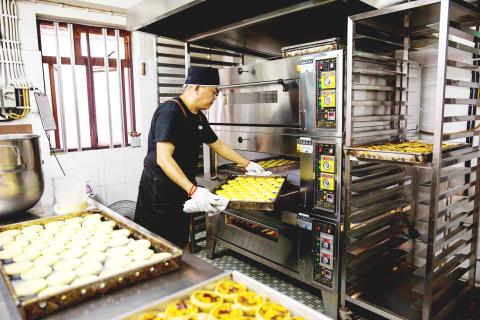With their flaky pastry casing, creamy custard filling and brulee topping, Macau’s Portuguese egg tarts are as much a part of the Chinese enclave’s fabric as its casinos — but their origin is surprisingly British.
Across the city it is not uncommon to see long lines of tourists patiently queuing for the sweet treats, a sight that might not seem all that surprising given the former Portuguese colony’s most famous dessert is based on Lisbon’s equally renowned pastel de nata.
But the current craze for Portuguese-style egg tarts — which has spread across China and parts of Asia in recent years — owes much of its success to a Briton who blundered into the business.

Photo: AFP
The tale began three decades ago when Essex-born industrial pharmacist Andrew Stow opened Lord Stow’s bakery at the southern harborside village of Coloane.
“In 1989, recognizing there were no Western street-side bakeries... he decided to do something for the local Portuguese community, which was to create a pastel de nata for them,” said Eileen Stow, Andrew’s sister, who now manages the business.
With no original recipe for pastel de nata to use, Andrew experimented with a heavier British custard filling, based on a family recipe, and Portuguese pastry techniques.
The creation initially raised a few eyebrows among Andrew’s Portuguese friends in Macau, but the local Chinese community became hooked.
Courtesy of the British, Cantonese cuisine already had a version of an egg tart, made with shortcrust pastry and a more jelly-like filling.
“To differentiate it from what they recognized in dim sum, a dan tat [egg tart in Cantonese,] they call it a po tat,” meaning Portuguese egg tart, Eileen said.
The creamier, flakier, richer versions were a roaring success.
“That’s how it grew before the days of ‘likes’ online. It’s just word of mouth,” added Eileen, who took over the business after her brother’s death in 2006.
The business now churns out 21,000 handmade egg tarts per day from three bakeries in Macau, and it also boasts two franchises in Japan and Manila.
A string of rivals have cropped up in the last three decades in Hong Kong, Taiwan and Singapore.
One of the best-regarded Macau competitors was set up by Andrew’s ex-wife Margaret Wong.
She sold her recipe to KFC, which now offers Portuguese egg tarts at outlets across China, a move that has introduced Macau’s Portuguese-British hybrid to hundreds of millions more hungry mouths.

May 11 to May 18 The original Taichung Railway Station was long thought to have been completely razed. Opening on May 15, 1905, the one-story wooden structure soon outgrew its purpose and was replaced in 1917 by a grandiose, Western-style station. During construction on the third-generation station in 2017, workers discovered the service pit for the original station’s locomotive depot. A year later, a small wooden building on site was determined by historians to be the first stationmaster’s office, built around 1908. With these findings, the Taichung Railway Station Cultural Park now boasts that it has

Wooden houses wedged between concrete, crumbling brick facades with roofs gaping to the sky, and tiled art deco buildings down narrow alleyways: Taichung Central District’s (中區) aging architecture reveals both the allure and reality of the old downtown. From Indigenous settlement to capital under Qing Dynasty rule through to Japanese colonization, Taichung’s Central District holds a long and layered history. The bygone beauty of its streets once earned it the nickname “Little Kyoto.” Since the late eighties, however, the shifting of economic and government centers westward signaled a gradual decline in the area’s evolving fortunes. With the regeneration of the once

The latest Formosa poll released at the end of last month shows confidence in President William Lai (賴清德) plunged 8.1 percent, while satisfaction with the Lai administration fared worse with a drop of 8.5 percent. Those lacking confidence in Lai jumped by 6 percent and dissatisfaction in his administration spiked up 6.7 percent. Confidence in Lai is still strong at 48.6 percent, compared to 43 percent lacking confidence — but this is his worst result overall since he took office. For the first time, dissatisfaction with his administration surpassed satisfaction, 47.3 to 47.1 percent. Though statistically a tie, for most

In February of this year the Taipei Times reported on the visit of Lienchiang County Commissioner Wang Chung-ming (王忠銘) of the Chinese Nationalist Party (KMT) and a delegation to a lantern festival in Fuzhou’s Mawei District in Fujian Province. “Today, Mawei and Matsu jointly marked the lantern festival,” Wang was quoted as saying, adding that both sides “being of one people,” is a cause for joy. Wang was passing around a common claim of officials of the People’s Republic of China (PRC) and the PRC’s allies and supporters in Taiwan — KMT and the Taiwan People’s Party — and elsewhere: Taiwan and